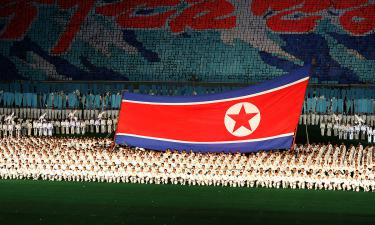What a crazy idea
If political conventions are designed to showcase a candidate's biggest asset, then George W. Bush's will revolve around one thing: 9/11. Ever since Republicans chose New York - an overwhelmingly Democratic city in a state certain to back John Kerry - as their convention site, it has been clear that the memory of the 9/11 attacks would be central to the president's reelection effort. Throughout the week, Republicans hope to resurrect what many Americans still see as Mr. Bush's finest hours - his leadership in the wake of the attacks, when many voters bonded with their president and gave him overwhelmingly high approval ratings At the same time, the Bush campaign plans to remind voters of the threat the nation still faces, a threat they say is likely to grow more dangerous in the future, elevating the stakes of the upcoming election, and making the choice of president even more important. Yet as the third anniversary of the terrorist attacks approaches, the legacy of 9/11 has become more complicated for the president, presenting political risks along with opportunity. References to such a searing emotional event could come across as exploiting a tragedy - something critics accused the Bush campaign of doing when it ran its first advertisements using 9/11 footage, months ago. More problematic, the president's handling of the terrorist threat has lately generated pointed criticism as well as praise - both from neutral sources such as the bipartisan 9/11 commission, as well as partisan opponents such as filmmaker Michael Moore, whose movie "Fahrenheit 9/11" highlighted the seven minutes Bush continued to sit with schoolchildren he'd been visiting after learning that the second tower had been hit, informs The Christian Science Monitor. According to Newsday, Former President Clinton, quoting scripture from a church pulpit, sought to frame the 2004 election in moral terms on Sunday and said President Bush's Christianity doesn't keep him from seeing things "through a glass darkly." Hillary Rodham Clinton said Bush's re-election "would be a disaster." A day before the Republicans opened their convention, the Clintons spent the day reminding the GOP that New York City is still a Democratic town. Before joining her husband at church, Sen. Clinton, D-N.Y., made the rounds of TV talk shows. When asked if she agreed with Democratic presidential nominee John Kerry's call for Defense Secretary Donald H. Rumsfeld to resign, she said, "I'm hoping the entire administration is fired on Nov. 2." Her husband, the former president, speaking at Riverside Church in upper Manhattan, said, "Politics and political involvement dictated by faith is not the exclusive province of the right wing." The Democrats, Clinton argued, need to show their policies are also rooted in faith. "The religious right has tried to turn us all, in disagreeing with them, into two-dimensional cartoons," he said. Speaking of Bush's religious beliefs, he said, "I believe President Bush is a good Christian. I believe that his faith in Jesus saved him. I believe it gave him new purpose and direction to his life. USATODAY reports that the GOP could evoke memories of President Bush's stirring remarks at Ground Zero three days after 9/11; underscore the reason for his war on terrorism; and give New York an economic, image and morale boost. But now that the convention is here, some people are saying: What a crazy idea! For the president, 9/11 and its related issues – Iraq, terrorism, foreign relations – seem less of a political plus than in January, 2003, when the GOP announced plans to convene in Madison Square Garden. "New York was where the president stood up and said, 'I'm going to protect you,'" says Ruth Mandel, director of the Eagleton Institute of Politics at Rutgers University. "That's the theme of his campaign. But things have gotten a lot more complicated since the convention was planned. My guess is that if they had it to do over, they'd rethink their choice of New York."
Read earlier news stories by PRAVDA.Ru
Subscribe to Pravda.Ru Telegram channel, Facebook, RSS!




